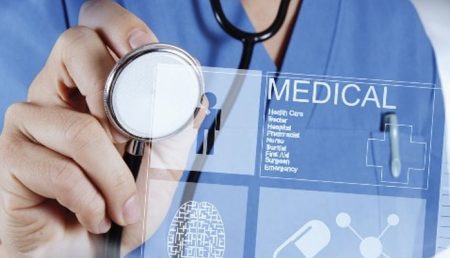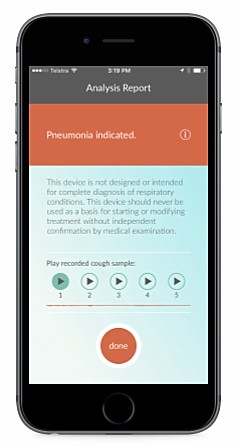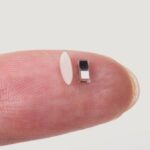October 24, 2016 – ResApp Health, an Australian company aimed at commercializing research from University of Queensland, with initial funding from the Bill and Melinda Gates Foundation, has launched a smartphone app that uses signal-processing algorithms (software code) to detect patterns in breathing associated with a number of respiratory diseases.
In an initial 2013 trial at Sardjito Hospital, Indonesia, which involved 91 patients, the app successfully diagnosed childhood pneumonia with 85% accuracy on cough sounds alone.When presence of fever and other symptoms were noted accuracy in diagnosis increased above 95%. The clinical study also accurately diagnosed asthma although that was not the focus of the initial trial.
Current much larger trials at Wesley Hospital, Brisbane, Joondalup Health and Princess Margaret Hospital, Perth, have so far achieved similar if not better diagnostic results in a group that includes smokers, non-smokers, chronic obstructive respiratory disease (COPD), a disease category that includes emphysema and bronchitis, asthma, pneumonia and upper respiratory tract infections (URTI). The trials include 598 children and 322 adult subjects with more signing up. Preliminary results of these clinical trials have been published with accuracy based on cough sounds alone exceeding 90%.
How does ResApp work?
The app acts like a physician listening to breath sounds through a stethoscope. Instead of the stethoscope we have the smartphone microphone which records sound and then matches the results against sound signatures from a database that accurately characterizes respiratory diseases. A patient’s cough has always been the best way for doctors to make diagnoses during a chest examination. That’s because normal breathing sounds are dampened by chest muscles but a cough connects the lungs directly through the bronchi and trachea to the outside making audible sounds produced excellent sources of information. When ResApp hears a cough it compares unique signatures for asthma, COPD, pneumonia, emphysema and URTI with what it records.
Three U.S. hospitals are now using ResApp in clinical trial. This assessment called Smartcough-C involves a multi-centre, double-blind study to see if the app can accurately diagnose childhood pneumonia.
ResApp has the potential to be used not just in clinics, emergency rooms and outpatient facilities, but also as part of a telehealth system for doing remote diagnoses.
Some stats about respiratory diseases:
- 235 million people suffer from asthma (1 in 7 children, leading to 250,000 deaths annually)
- 65 million people suffer from moderate to severe COPD (that’s 1 in 5 adults over age 45 and leading to 3 million deaths annually)
- pneumonia caused 920,000 childhood deaths in 2015, 15% of under-five deaths with most victims less than 2 years of age
- Acute URTIs from indoor air pollution in one European study accounted for 4.6% of all deaths in 2004 with statistics much higher in the Developing World where cooking fuels are used indoors.
- URTIs impact 5 to 15% of the global population annually with influenza epidemics responsible for up to 5 million cases and 250,000 to 500,000 deaths.
It would seem that an app like ResApp could be useful in early diagnosis and treatment particularly in those areas of the planet where medical infrastructure and availability of doctors is minimal.









